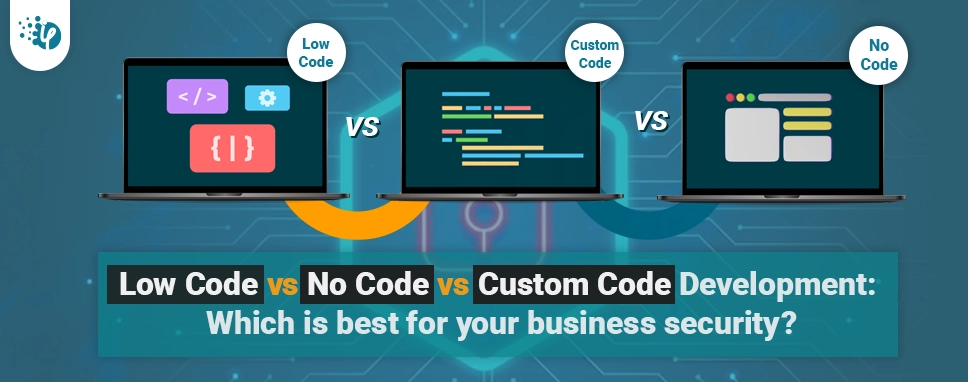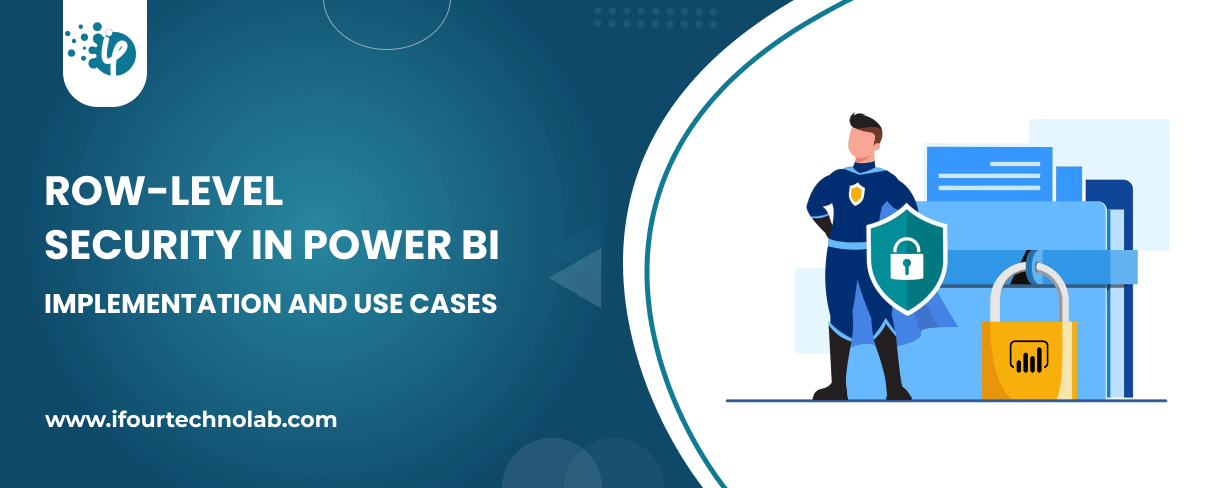Power BI Report Server: Key Features and Elements
Every CTO knows the struggle of managing complex reports. The inefficiency of scattered data, the constant juggling between reporting tools, the challenge of ensuring accurate KPIs...
Kapil Panchal - October 04, 2023
Listening is fun too.
Straighten your back and cherish with coffee - PLAY !

The software world is divided into three categories: no-code software development, low-code software development, and custom software development. Each one has its own importance in helping businesses improve their online presence.
In this blog, we will learn about the essentials and importance of low-code development, no-code development, and custom-code development. We will also examine the security aspects of these three platforms and the reasons to go with the best one.
Low code development might sound like a tech buzzword, but let's break it down in simple terms. Imagine you want to build a sustainable solution, like a database-driven website or a flawless mobile app. Now, instead of needing a team of software developers to write thousands of lines of code, you have a set of handy low-code platforms at your disposal. These tools are like the building blocks of your dream application, and they don't require you to have technical knowledge to put them together.
If you're a beginner, you can get assistance from consultants or Power Apps consulting service providers to start using a low-code approach.
Low code development simplifies the process of creating software. It's like giving you a user-friendly toolkit for building digital stuff. You don't have to start from scratch and write programs line by line. Instead, you use visual interfaces and pre-built components, a bit like LEGO bricks, to create your software. It's a game-changer for non-tech business professionals and individuals who aim to turn their ideas into reality without coding knowledge.
One of the big perks of low code is speed. With traditional coding, projects might take longer to finish (for weeks or months). Low code development, on the other hand, can have your software up and running much faster.
When you are cutting out a lot of manual programming work that means you are saving time and gaining quicker results. Isn’t it? Whether you're a business pro looking to streamline processes or an aspiring app creator, low code development can be your shortcut to getting things done correctly and efficiently.
So, in short, low code development is all about simplifying and speeding up the software creation process. It's accessible to the ones who aren't coding experts and stands as a valuable tool for business professionals and enthusiasts looking to turn their software ideas into reality without the headache of extensive coding.
Low code development brings a set of benefits that can make work processes smoother and more efficient. Here's a straightforward breakdown:
While low code development has its perks, it's not without its limitations. Here's a no-nonsense look at the downsides:
So, in short, minimal code development provides significant benefits in terms of speed, affordability, accessibility, cooperation, and maintenance. However, to make an informed choice regarding its applicability to your projects, you must be aware of its limits, such as customization constraints, scalability problems, vendor lock-in, and security challenges.
Let's demystify the buzz around "No Code Development." It's not as complicated as it might sound. Imagine building digital solutions, like apps or websites, without getting your hands dirty in coding. That's what no code is all about.
At its core, no code development simplifies the process of creating software. Instead of writing lines of complex code, you use user-friendly interfaces and pre-built components, almost like crafting something with LEGO bricks. No need to be a tech whiz; it's designed for regular folks who want to bring their ideas to life.
The cool thing about No Code is that it's not just for the tech-savvy crowd. Business professionals and creative minds can jump right in. You don't need to decipher the mysteries of programming languages. It's like having a superpower to turn your software dreams into reality, even if you've never coded a day in your life.
Speed matters in today's fast-paced world. No code development lets you get your software up and running quickly. It's like ordering pizza – you don't have to wait forever to satisfy your craving. Whether you're streamlining business processes or bringing your app idea to life, no code can get you there faster.
So, there you have it – no code development in plain English. It's about making software creation accessible to everyone, speeding up results, and keeping coding complexities at bay. Whether you're a business pro or a creative thinker, no code development could be your ticket to software success.
No code development has some tricks up its sleeve that can make your work processes smoother and more efficient. Here's the lowdown:
While no code development offers many advantages, it's not without its limitations. Here's a no-nonsense look at the downsides:
In a nutshell, no code development offers notable advantages in terms of speed, accessibility, cost-efficiency, collaboration, and streamlined maintenance. However, it's vital to be aware of its limitations, including customization constraints, scalability challenges, potential vendor lock-in, and the importance of maintaining robust security practices to make an informed decision about its suitability for your projects.
It is the process of implementing business software or an application based on the client’s unique requirements. What makes it different from No-code and Low-code platforms is the ability to add custom code and develop bespoke functionality rather than settling down for the defaults.
Custom software development, at its core, is like tailoring an outfit – it's designed to fit your specific needs like a glove.
Custom software is not your off-the-rack solution; it's handcrafted to address your unique challenges and requirements. Whether you're a business professional or an individual with a vision, custom software is about bringing your ideas to life.
The real magic happens when your software perfectly aligns with your business processes. It streamlines workflows, improves efficiency, and can even give you a competitive edge. Custom software isn't one-size-fits-all; it's tailored to fit your organization's unique contours.
With custom software, you're the captain of the ship. You have full control over features, design, and functionality. No need to adapt your processes to fit pre-made software – it's the other way around.
Fine-tuned security is a hallmark of custom software. Your developer can build robust defenses tailored to your data and privacy needs.
To put it simply, bespoke software development is about creating a digital solution that's uniquely yours. It's like having a suit designed to fit you perfectly, rendering your business efficiency and your work processes smoother while keeping your data safe and sound.
Given below is a detailed comparison of the best features and risks associated with Low Code, No Code, and Custom Development.
| Security Aspect | Low Code Development | No Code Development | Custom Development |
|---|---|---|---|
| Speed vs. Security | Rapid development can sometimes prioritize speed over security, potentially leading to vulnerabilities if not managed properly. | Similar to Low Code, No Code emphasizes speed, which can pose security challenges if not addressed adequately. | Custom development allows for precise security controls but might take longer to implement. Security depends on the expertise of the development team. |
| Pre-Built Components | Using pre-built components might expose your application to security flaws if the components are not thoroughly vetted and maintained. | No Code platforms often rely heavily on pre-made modules, increasing the risk if these modules have vulnerabilities or aren't regularly updated. | Custom development gives you full control over component selection, but the responsibility for security rests entirely on the development team. |
| Code Review and Testing | NoWith less custom code, there might be fewer opportunities for in-depth code reviews and security testing. | Similar to Low Code, No Code platforms might not allow extensive code reviews, leaving potential vulnerabilities undiscovered. | Custom development allows for rigorous code reviews and security testing, reducing the chances of hidden vulnerabilities. |
| Scalability and Complexity | Low Code and No Code might struggle to handle highly complex or scalable applications securely, particularly in cases with intricate business logic | While No Code can be limited in handling complexity, Low Code offers more flexibility but still requires vigilant security management for complex projects. | Custom development is suitable for highly complex and scalable projects but requires careful attention to security throughout the development lifecycle. |
| Data Privacy and Compliance | Meeting specific data privacy and compliance standards might be challenging with pre-built solutions, requiring | Similar to Low Code, No Code might struggle to meet stringent data privacy and compliance requirements without customization. | Custom development provides full control over data privacy and compliance but requires a thorough understanding and adherence to |
From the above discussion, we can understand how each development approach is different and comes with its own set of security challenges. No Code and Low Code prioritize speed and accessibility but may require careful management to mitigate security risks. Bespoke Software Development offers the most control but demands a higher level of expertise and resources to ensure robust security throughout the development process. The choice should align with the specific security needs and complexity of your project.
Let’s keep it short and simple. Custom software development is better as you can customize your application as per your requirements. You may implement additional features of security such as two-way authentication, OTP authorization, fingerprinting, custom validations, and many more. Take a look at some other features that make bespoke application development much better.
Custom software is like a tailor-made suit for your business. It bends and stretches to fit your needs, letting you choose what you want and what you don't.
Custom software often means extra security muscle. Experienced developers know their way around cybersecurity and can build a sturdy fortress for your software. Plus, you get to pick your security tools.
Think of custom software as your own chef – you get to pick the ingredients. You can request designs and features that make your product stand out, and it plays well with your existing processes.
Custom-made software slides into your setup as it belongs there. It's a smooth transition, no awkward adjustments needed.
Custom software doesn't have to break the bank. You can find top-notch developers in places like Eastern Europe who offer great value without the sky-high price tag.
With custom software, you've got a dedicated support crew on standby. They'll tackle any issues and keep things running smoothly, no sweat.
The software world is divided into three categories: no-code software development, low-code software development, and bespoke software development. Which one is ideal depends entirely on the company's core requirements, as well as other factors like business size, target audience, effective features, and many more.
In this article, we have learned about the principles of bespoke application development, low-code application development, and no-code application development. We have thoroughly examined the security aspects of these three platforms and the reasons to go with customized code development.
We hope you have got a clear idea of these platforms, and learned a lot of new stuff that you weren’t aware of previously. Check out our blog section for more informative blogs.

Every CTO knows the struggle of managing complex reports. The inefficiency of scattered data, the constant juggling between reporting tools, the challenge of ensuring accurate KPIs...

The very first reason why you should implement Row Level Security is to foster trust, a crucial element for any business's success. Next, it reduces data clutter and helps you load...

The performance of Power BI is significantly influenced by two essential factors: design consistency and the rapid loading of BI elements. This holds true whether you choose Tableau...